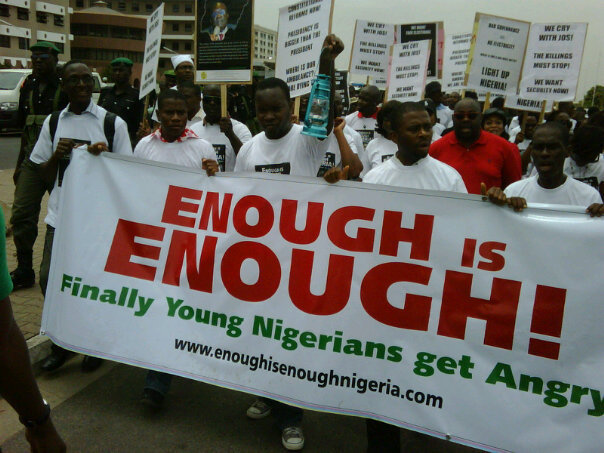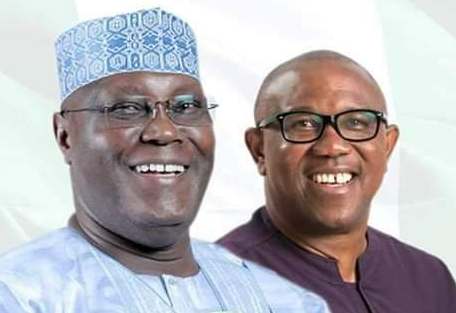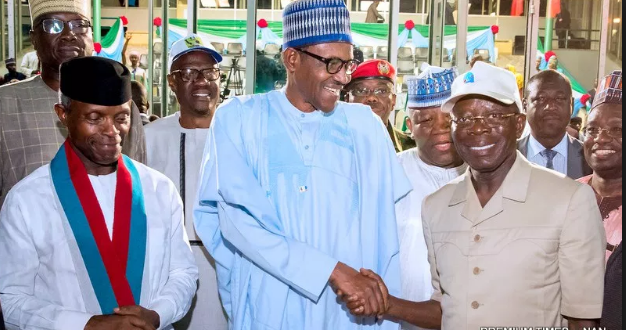Chris Odinaka Nwedo

From the start to the finish lines, Nigeria’s democratic processes are customarily designed to fail by those who exploit the implausible exercise. This is why such processes manifestly finished manipulated, incredibly fraudulent and bereaved of integrity. It is generally noted that the nation’s developmental difficulties were made more complex by destabilization and deep controversies orchestrated by duplicitous elections where in some cases the losers are crowned
Pre and post 2015 elections and all other elections experiences unfortunately demonstrated that democratic political culture has yet to be truly domesticated in Nigeria. This is in spite of the hypothetical strong and compelling waves of democratization processes witnessed in the early 1999 with the metaphorical weeding away of nauseating frequencies of unsolicited and injurious military interferences in the national politics. The intermittent capture of political power by the soldiers that destabilised national democratic institutions were entirely accountable for so much of the difficulties frustrating adoption of more positive, inclusive and cautious perception of politics and governance in Nigeria. This is because the mutinies aborted the essential learning processes and did nothing meaningful to reposition the political space and engineer stability compatible with productive politics. Productive politics, contextually, is an inclusive and fair political atmosphere crucial for democratic values to thrive successfully. Here, I mean politics that has positive values to add in the individual and collective aspirations of Nigerian people, stabilising and benefitting the citizens. On the contrary, democratization in Nigeria has remained an infuriating journey, a positive step forward and multiple negative steps backward. The perception is that Nigeria is continuously regressing and sinking under a preponderant weight of incompetent, parochial and lifeless leadership flanked by power drunk superintendents. The launching pad for power which is multi-party elections are disparaged by destabilising vicious violence, hateful campaigns speeches, imposition of candidate and stealing of votes. The nasty election circles are actively being replaced by targeted assassinations and scandalous ‘open-market’ for vote buying. The vote-buying enterprises have enormous potentials to infest Nigeria with criminal minded politicians working harmoniously with treacherous civil servants in a surreptitious project to sabotage the nation.
From the start to the finish lines, Nigeria’s democratic processes are customarily designed to fail by those who exploit the implausible exercise. This is why such processes manifestly finished manipulated, incredibly fraudulent and bereaved of integrity. It is generally noted that the nation’s developmental difficulties were made more complex by destabilization and deep controversies orchestrated by duplicitous elections where in some cases the losers are crowned. The display at recently concluded Peoples Democratic Party (PDP) National Convention in Abuja exposed again the uncontrollable wild sides of some politicians. Even when the convention was heralded as triumphant because the exercise was considerably credible beyond the routine, it was heavily criticized as “charade and an anti climax” due to the suspicion that the exercise was manipulated by the use of ‘Unity List’. Unity list allegedly contains names of ‘anointed’ candidates the national delegates were persuaded to endorse. It was also alleged that money was also employed in dissuading the delegates to vote against their consciences. For the critics, the 9th December convention at Eagles Square “was another night of the long knives. After the macheting, the ego slaying, the marching out, and the intrigues of Caesarian flavour, the PDP was left in a worse state than it had been. It was sad. It was disappointing. It was a big let down. The All Progressives Congress has been gloating, trying to score a cheap point out of the melodrama of this PDP Convention, but it does not lie in the mouth of the APC to put down the PDP Convention.1 According Abati R. “everyone who had been a witness to the travails of the once-upon-a-time ruling party which lost power to the All Progressives Congress in 2015 – viz, the humiliation, the victimization of the party and its agents by the successor-government, the catastrophic seizure of the party by a certain Ali Modu Sheriff, the desertion of the party by opportunists seeking fresh foothold, protection, and relevance in the new ruling party, the pummeling of the party as a party of corruption by both the stupid and the knowledgeable” would be saddened to see the party, PDP falling to appropriate the experiences of the past for its advantage.2
Nevertheless, like every other electoral event in Nigeria some have gone to court seeking to invalidate the convention ‘missing names’ and the ‘unity list’ were among the contentions for the nullification request. Taoheed Adedoja, for instance wanted “the nullification of the election of the new executive on the premise that his name was removed from the ballot for the election for national chairman. Adedoja’s move came despite the strident moves by the Governor Seriake Dickson led Post-Convention Reconciliation Committee to sooth grievances arising from the convention that threw up Prince Uche Secondus as national chairman.3 Adedoja told the press that his name was “excluded on the ballot, making it impossible for delegates to vote for him at the convention and expressed disappointment at the manner of his treatment by the convention planning committee. According to him, “I went to the convention for the position of national chairman of the party with the strong belief that the party needed a chairman with wide experience, acceptability across Nigeria, integrity and a man with fresh and innovative ideas with a view to bringing intellectualism to the governance of the party4.” Adedoja reportedly said he “paid the necessary nomination fee, obtained and returned the national chairmanship nomination form; was invited for screening and subsequently screened with clearance certificate issued to him at a well-attended ceremony at the PDP headquarters in Abuja in Thursday, December 07, 2017. Surprisingly, on the election day of December 09, 2017, his name was deliberately excluded from the list of national chairmanship contestants posted on the ballot boxes/ cubicles meant for the election of the national chairman of the party, thereby, wilfully and unlawfully excluding me from participating in the said election.”5 If the truth has to be said, Adedoja’s name was not removed rather one of his names was misspelt. It was an exaggeration to say that his name was removed from the ballot. PDP has no firm pedestal to exonerate itself from this self-refutation because “we had thought that given the humiliation it has suffered since its exit from power, given also, the winner-takes-it-all and vindictive posture of the ruling APC, and given, if we may add, the obvious failure and refusal of the APC to impress the people with quality governance, the leaders of the PDP would do everything to project their party unto a higher pedestal and regain the confidence of the Nigerian people.6 However, this brand of brewing controversy is methodical due to the untamed nature of our politicians. There has never been an election devoid of allegations and controversies of these kinds. Nigerians should not be surprised if eventually the courts decide to annul the convention on any of the pretexts. Without dispute, PDP convention was bruised, but the ruling party, APC perennially unable to manage its own internal affairs, it failed stupendously in uniting its members on any issue. Today, the conspicuous signal is that APC is covertly and intensely divided, it is waiting for an opportunity to implode. It is embarrassing enough that “the APC has repeatedly failed to hold meetings, congresses and convention in the last three years and has flagrantly continued to violate its own constitution.7
Essentially, the excitements of election victory by well-intended voters have always been ruined by prospects of disqualifications at the tribunals. The tribunals in Nigeria, as we all know, are yet to be insulated or shielded from unhealthy political influence and miscarriage of justice. Miscarriage of justice is a failure of a court or judicial system to attain the ends of justice. Many of these wrong judgments are audacious precedent for arbitrariness and impunity by political parties in the selection and nomination of their candidates. The immediate impact of the miscarriages of justice are always that parties and all sorts of political god-fathers are emboldened by these judgments. They are encouraged to continue the political rascality and lawlessness to the ruin of common interest, justice and democratization. Biased judgments are conspiratorial treacheries the Nigerian people and have recipes for social unrest, political instability and lethal violence in Nigeria over the years. Ayodele Fayose described some of the tribunal judgment as “ridiculous political judgment that can never stand before men of good conscience and God.8 The mismanagement of courts and countless court verdicts considered as negation of justice postpone the Nigerians’ right to a positive society and better life.
Favourable verdicts are allegedly ‘sold’ to sentiment and/or material gains. The contestations of elections’ results generally rob the state irreplaceable time and resources and dry-up the opportunities for quick and meaningful harvesting of the democratic dividends. The controversies delay and made the dividends almost impossible for most Nigerians who groan under traitorous political instabilities, improper policy direction, confusion and disturbing insecurity. “The tragedy of Nigerian politics right now is that we do not yet have, 18 years after our return to democracy, a political party that represents the closest ideals of democracy. There are 50 political parties or so on the list of the Independent National Electoral Commission (INEC) but they are all special purpose vehicles, designed to put ambitious men and women who go by the title of professional politicians in the corridors of power and more precisely, in close proximity to Nigeria’s resources.9

The cancellation of elections in Rivers and Akwa-Ibom states are some of the instances. It is yet to be established that the judgment that invalidated the elections were defensibly fair, credible and in interest of democratic standards of the citizens concerned. Devoid of disdainfulness, many analysts see the verdicts as ‘redistributive’ and vindictive. The judgments annulling the outcome of 20 out of 32 state constituency elections and ordering guber re-run were particularly exceptional for many observers. The annulment which was perceived in some quarters as reward to Rotimi Amaechi for the audacious sponsor of APC victory in 2015 was heralded by inflammatory or derogatory attacks on the judiciary. The vitriolic attacks on the presidency and judiciary were bound to continue as far as the judgments were presumed to be biased and insensitive. Meanwhile, the PDP National Publicity Secretary, Chief Olisa Metuh, described the verdict as completely bizarre, unacceptable and part of a script by the APC to manipulate the will of the people. For Metuh, the seeming collaboration between the APC-led federal government and a section of the judiciary is worrisome and portends grave danger to the corporate existence of Nigeria. For Metuh the unholy alliance is shoddier than corruption that the president claimed to be fighting. And to many in the PDP fold the verdict was a clear demonstration of deep bias against PDP and poses great danger to the sanity of the polity. The bias in the judgment against the PDP in Rivers as well as Akwa-Ibom is evidenced in the contradictions inherent in the trial process of the two cases and the verdicts therein, whereby the tribunals clearly disregarded standing legal norm that a petitioner must establish prove of claims.
The counterfeit election practices and the deceitful means of stifling legitimate electoral claims endorse assumptions that basic democratic values among Nigerians are terribly pitiable and unbalanced. This development has been ascribed to warped mentality and disorienting tendency for quick power and prosperity. The situation is compounded by the failures of the successive governments and relevant institutions to inspire positive attitudes on national issues and appropriate democratic values.
The elections are exceptional occasions exposing intense ignorance and deep divisions complicating our national fault lines. It is revealing that so many Nigerians do not understand politics of objectivity, and those who do, seem intensely vulnerable to sectarian sensations and objectionable impacts of whimsical political bigots. The denigrating situation has no reason to haunt Nigeria if the state and civil society institutions are active and diligent. But the national institutions are atrophied by impunity, personality driven, corrupt and inefficient while some founders of civil society organisations appeared to be clever attention seekers who are endlessly discordant and biased.
We need to get things right in governance. As discordant and biased CSOs have been largely deficient as watch-dogs and proven vehicles for political education and mobilisation of the citizens. The poor electoral harvest speaks volumes of the profound apathy. Political apathy is among the inputs for vote-looting and manipulation of the electoral processes. The values trustworthy CSOs can be immeasurable in facilitating politically productive citizens. The productive citizens are potent in diverse ways in making real democratisation of politics feasible in Nigeria. The citizens active involvement in the process are harbingers to elimination political fraud, prejudices and venomous sensationalism while inclusiveness and objectively free selection wipes-off miasma of unwieldy influences in the system. I believe, it is the distasteful influences of bad politics that lubricate vicious favouritism, violence and assortments of political indiscretion truncating opportunities for quick-fix in our political democratisation drive.
My proposition is that several national authorities have not done enough to encourage positive predispositions in Nigerian politics. The system of governance takes the principal blame, even, the apathetic citizens bearing the burdens of the political indiscretion are not helping the system. Nigerians are too complacent and not bargaining resolutely and successfully from the political class. As Nigerians, we failed to bring pressure to bear on the leadership for socio-economic and political trademarks compatible with our dreams and aspirations. Positive pressure can lead to prudent leadership and good governance. Nigerians have not done enough comparatively and the consequences of the indifference are massive and maliciously destabilizing.
Never-die tactless political conflicts in Nigeria start methodically with malevolent plots and traitorous conspiracies at intra-party primary elections and increases in tempo and ferocity with allotment of positions after victory. Intra and/or inter party crises have been co-existential with multi-party experience in Nigeria. These have been profoundly destabilizing factors in the evolution of the culture of productive democratic politics in the country. The conflicts are given rise by the failure of the parties concerned to provide solutions and reunite effectively the disagreeing members. Failure of rationality is the quest for political power are responsible for inter or intra party conflicts. The outcomes of these conflicts have been catastrophic ranging from fractionalization to violence and social instability on the macro-levels. Intra-party crisis is responsible for the reluctant germination and growth of democratic culture planted in Nigeria about six decades ago. Internal party democracy is an issue that has consistently eluded Nigerian democracy because political parties have always been hijacked at all levels by powerful individuals who impose loyalists as candidates for election. According to Ajayi Stephen, the pervasive level of intra and inter political party crisis in Nigeria’s political system can be attributed to the state of mind and perception that politics is the most lucrative industry in the country. These believe is intensified by the growing culture of impunity and blatant disregard of the rule of law emblematised by the Nigerian political elites. Unfortunately, political parties have become veritable platforms for the political elites to assume power through elections that are often characterised by fraud and other forms of electoral malpractices.10 At the primary elections, teams of various godfathers or the so call supremoes select, anoint, impose, isolate, undermine, standardize illegality and deal ruthlessly with potential adversaries. Some of the recent primary elections for guber candidates particularly of APC in Bayelsa and Kogi are typical of the miasma in the political system. The exercise in Bayelsa reportedly was of bad test. The inexcusably depraved outing was further stained by intrigues, controversy and disrupted by hired thugs as 14 aspirants at the primaries led by Timi Alaibe staged a walk-out alleging irregularities in the process.

Adams Oshiomhole, the former governor of Edo State and the chairman of a multi-men electoral committee denounced the outcome alleging criminal conspiracies, kidnapping and holding captive of himself and committee members by hoodlums loyal to Timipre. The Bayelsa episode is a case of Timipre and some conspiratorial groups fighting fiercely to unilaterally impose a choice on the party. The imposition of candidates is hands in glove with repressive and the brands of godfather politics denigrating democratic aspiration of Nigerians. The occasion exposed the inherent barbaric and embarrassing attitudes of our so called reverential leaders when it comes to business of political power. Hired thugs purportedly on the order of Timipre chased, threatened and assaulted rivalries according to reports. These politicians are full of guile and bile; they would do whatever it takes to remain relevant, and once they gain power, they use it as they wish. More than two years after taking power, the APC has not been able to define what it had in mind when it campaigned on the platform of “change”. It has not been able to hold a Convention or form a Board of Trustees. Its leaders are divided, the government it has put in place is hobbled by inter-agency/intra-governmental rivalry and misunderstanding.11 For Abati “APC has proven to be no better, if not worse than the PDP it replaced. In the elections that have been held under the watch of the APC, be it in Ondo, Edo or Anambra, electoral integrity was a problem; whatever irregularities or chicanery may have been on display at the PDP convention are not alien to the APC or any other Nigerian political party.12
During the last general election about thirty-seven people were murdered across Rivers state for political reasons. This is one of the greatest tests of the sacrosanctity of our electoral processes. The tensed conditions in the state degenerated with the vexatious cancellation of many results of the last election, the sack of the governor and rerun of the guber election. This was because as the elections approached, the degree and intensity of the orchestrated violence against opponents assumed more fear-provoking dimensions. Inter-party thugs, malevolent sympathisers and hirelings basically ready and determined to commit murders with tacit consent of those in charge. The objective of the violence was to frighten and intimidate opponents’ supporters into believing that it was unsafe for them to come out and vote, thus effectively disenfranchising them.
In the general election, politicians emblematically embalmed and sold malicious hate speeches and ordinary masses bought them all. The same ordinary people are repetitively the defenceless victims when the desperate politicians inflame the society and cause great havoc. In many states of the north particularly in Katsina the former President, Goodluck Ebele Jonathan and his campaign trail were harassed and stoned. The stoning of GEJ was a felonious rebellion, a violation of his rights of expression and a gross aggression to Nigerian state. The disparaging deportments were in practical terms extremely irresponsible and remarkably dangerous because the implications of such audacities are multi-faced. Evidently, the rebellious attitude and other heinous electoral crimes were sponsored by strong and wrong political supremoes who operate with impunity.
However, the aggressive contest for power is incensed after victory. This is real phase of the traitorous maneuvers, fraudulent schemes and heartbreaking sabotages. Recall the show of shame in the National Assembly when the ruling party, APC, was embroiled in a spiteful tussle for leadership of the Assembly. The emergence of Senator Bukola Saraki as the President of the 8th National Assembly was not without surreptitious conspiracy against the APC’s endorsed Ahmad Lawan of Yobe State. In desperation, Saraki aligned with PDP to stripe, frustrate and over ruled the ruling party’s plans and propositions for the 8th Senate. The bitterness engendered by the Saraki’s uncompromising assertiveness inspired hunt for his head, and the leadership of the party appear determined to chastise the ‘apparent dissident’ and his collaborators disproportionately. For this reason the ruling party instead of letting go and concentrating on governance downed all tools to ‘slaughter’ Saraki first. For Bola Tinubu, Saraki is a man of “crass act of disloyalty’’. Meanwhile, pundits hypothesised that Saraki is not Tinubu’s problem. ‘Tinubu’s main problem is President Buhari who appeared to have relegated the kingmaker and surrounded himself with his fellow northerners and refused to be approached for suggestion. Whatever is the case, the project to get Saraki in chains is shared within the ranks of the APC’s hierarchy and one of the first handcuffs for Saraki is the Code of Conduct’s Tribunal trial. The docking of the Senate President has been sending shock waves across the two Chambers and it decelerated the enthusiasm of the legislators and ‘work in progress’.
The project of getting Saraki down humiliated by the Presidency seems be a consuming priority as the government has not shown clear program months after taken over while Saraki’s chastisement plan was fanned feverishly. The law makers on the other hand appeared perplexed and incapable of concentrating for the burden of making laws that will orchestrate change presumed to have been voted for. Saraki as the Senate President in Nigeria was not necessarily due to competency for the job but because he found opportunities in the opposition to sabotage his party for his specific interest. Even when he was capable, he was not designated by the party.
By the determination to denigrate the Senate President, it is clear that Buhari and his handlers are not ready to countenance independence of the legislature and by implication other major components of the polity. The desperations to machete Saraki at all cost exposed the acrimonious power struggle within the APC. While Buhari decidedly kept Tinubu in abeyance as he makes his choices of aids, heads must somehow roll. But interfering with internal operations of the autonomous house is comparable to hitting a hammer on a wrong head. The godfathers of APC were hoodwinked by Saraki and they fruitlessly fought back against the disillusioning denial of right to ‘fix candidates’ for the National Assembly. Installation of candidates is in the spirit and letters of our national brands of democracy.
Even if democracy goes beyond frequent elections and endorsing of ‘fixed candidates’, most Nigerians have no privilege of this universal franchise. The godfather that fixed candidates work-out the victory by disfranchising areas perceived as adversarial. Among the methods of marginalizing the opposition are starving them of elections/voting materials and paying the umpires to abscond, and surfacing later with doctored result sheets. The cancellation of entire results from opposition constituencies for ‘substantial noncompliance’ is a new dimension to the national impunity. Injustices punctuate Nigerian elections and violence has become dependable component of the exercises. Thus Nigerian democracy failed to foster security of life and property, allowed no room for transparency and accountability and permitted no the rule of law, good governance and shared prosperity.


